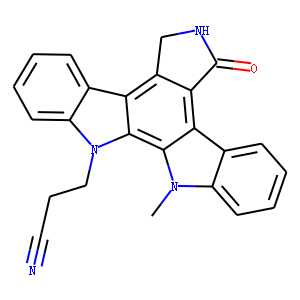| Reference | 1. PLoS One. 2014 Oct 15;9(10):e108963. doi: 10.1371/journal.pone.0108963.
eCollection 2014. <br />
Go-6976 reverses hyperglycemia-induced insulin resistance independently of cPKC
inhibition in adipocytes. <br />
Robinson KA(1), Hegyi K(2), Hannun YA(3), Buse MG(1), Sethi JK(2). <br />
Author information: <br />
(1)The Departments of Biochemistry and Molecular Biology and Medicine, Division
Diabetes, Endocrinology and Medical Genetics, Medical University of South
Carolina, Charleston, South Carolina, United States of America.
(2)The Department of Clinical Biochemistry, University of Cambridge Metabolic
Research Laboratories, Institute of Metabolic Science, Addenbrooke/’s Hospital,
Cambridge, United Kingdom.
(3)The Department of Medicine and the Stony Brook Cancer Center, Stony Brook
University, Stony Brook, New York, United States of America. <br />
Chronic hyperglycemia induces insulin resistance by mechanisms that are
incompletely understood. One model of hyperglycemia-induced insulin resistance
involves chronic preincubation of adipocytes in the presence of high glucose and
low insulin concentrations. We have previously shown that the mTOR complex 1
(mTORC1) plays a partial role in the development of insulin resistance in this
model. Here, we demonstrate that treatment with Go-6976, a widely used /specific/
inhibitor of cPKCs, alleviates hyperglycemia-induced insulin resistance. However,
the effects of mTOR inhibitor, rapamycin and Go-6976 were not additive and only
rapamycin restored impaired insulin-stimulated AKT activation. Although, PKCα,
(but not -β) was abundantly expressed in these adipocytes, our studies indicate
cPKCs do not play a major role in causing insulin-resistance in this model. There
was no evidence of changes in the expression or phosphorylation of PKCα, and PKCα
knock-down did not prevent the reduction of insulin-stimulated glucose transport.
This was also consistent with lack of IRS-1 phosphorylation on Ser-24 in
hyperglycemia-induced insulin-resistant adipocytes. Treatment with Go-6976 did
inhibit a component of the mTORC1 pathway, as evidenced by decreased
phosphorylation of S6 ribosomal protein. Raptor knock-down enhanced the effect of
insulin on glucose transport in insulin resistant adipocytes. Go-6976 had the
same effect in control cells, but was ineffective in cells with Raptor
knock-down. Taken together these findings suggest that Go-6976 exerts its effect
in alleviating hyperglycemia-induced insulin-resistance independently of cPKC
inhibition and may target components of the mTORC1 signaling pathway. <br />
2. Proc Natl Acad Sci U S A. 1993 May 15;90(10):4674-8. <br />
Gö 6976, a selective inhibitor of protein kinase C, is a potent antagonist of
human immunodeficiency virus 1 induction from latent/low-level-producing
reservoir cells in vitro. <br />
Qatsha KA(1), Rudolph C, Marmé D, Schächtele C, May WS. <br />
Author information: <br />
(1)Johns Hopkins Oncology Center, Baltimore, MD 21231-1001. <br />
Human immunodeficiency virus (HIV-1) infection is followed by a period of latency
or a low-level-persistent (LLP) state that results in an asymptomatic infection
of the host. Productive viral expression may be triggered by a variety of
activators including mitogens, antigens, and cytokines. Protein kinase C (PKC)
has been shown to be important in the intracellular cascade of signals induced by
such activators. With U1 and ACH-2 cell lines representative of an HIV-1
postintegration state, the effect of Gö 6976, a synthetic inhibitor of PKC was
tested. Gö 6976 is a nonglycosidic indolocarbazole found to potently inhibit
HIV-1 induction by Bryostatin 1, tumor necrosis factor alpha, and interleukin 6.
Gö 6976 effectively blocks viral transcription induced by Bryostatin 1 or tumor
necrosis factor alpha that leads to the inhibition of intracellular viral protein
synthesis and viral shedding. Gö 6976 also blocks interleukin 6-mediated
posttranscriptional induction of viral proteins. The IC50 of Gö 6976 shows a 12-
to 60-fold more potent effect than for H-7, another PKC inhibitor with a similar
mechanism. The inhibitory effect is reduced when Gö 6976 is not added before or
within 1 hr of induction by the potent PKC activator Bryostatin 1. However, U1
cells can be grown for long periods in a nontoxic concentration of Gö 6976 (300
nM), which confers virtual inhibition of HIV-1 induction without the development
of resistance. Results indicate that inhibition of HIV-1 proviral induction from
latent/low-level-producing infectious states with potent PKC inhibitors like Gö
6976 may represent an additional and promising antiviral approach. <br />
|

